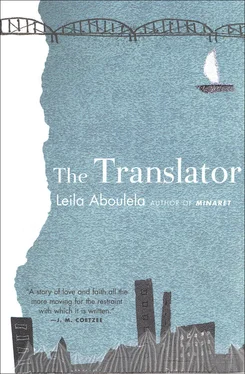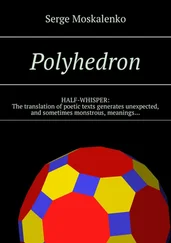‘Your voice is so beautiful,’ he said. He was feverish and the words came out of him in a jumble. Words that went to her head became little jewels, coloured gems, precious stones to carry around.
He said that he wanted to take her to places where she would forget and remember. Show her a bend in the Dee and she would see the Nile. Show her a house with a flat roof, a lighthouse that looked like a white minaret, castles where believers lived long ago, subservient to the climate. He said, ‘We could go for a drive when I get back to Aberdeen.’
She was silent. Listening to the sounds of the night, his breathing. Once upon a time, in another part of the world, were the fears someone will see us together, alone together… a woman’s reputation is fragile as a match stick… a woman’s honour… Reputation was the idol people set up, what determined the giving, the holding back. A girl’s honour… your father will kill you… your brother will beat you up… you will go to school the next morning as the bolder girls inevitably did, with puffy red eyes, unusually subdued.
But idols’ powers are not infinite. They cover a place, a particular community and a time. Sammar watched Reputation lose its muscle, its vigour, shrink and frizzle out in this remote corner of the world. When idols fall, the path to the truth is uncluttered, clear. Who saw her, knew her, was with her all the time wherever she went?
She said, ‘You are right. I would like to see castles where believers lived long ago helpless and yet strong, a lighthouse tall as a minaret, a house with a flat roof like my aunt’s house. But it would be wrong. I’m sorry, very sorry.’
She was afraid that he would be angry with her, impatient, bored. She bit her lips.
He said, ‘Don’t worry, don’t say sorry. I wouldn’t want you to do anything you are uncomfortable with.’
The next day he asked about her son. ‘You never told me your son’s name,’ he said.
She said, ‘He is called Amir, and it means prince.’ She thought of the child, walking barefooted in the mud, throwing his toys down from the roof, like Tarig. She said to Rae, ‘I worry about bringing him here. He will find it difficult at first, the weather, and all the layers of clothes he must wear.’
‘Do you know how to drive?’ Rae asked.
She did, long ago. ‘Am Ahmed taught her, taught them all, driving around the empty square, in the hot afternoons while Mahasen slept. The memory was vivid. Clouds of dust and jumpy starts.
She laughed, ‘Driving there is not like driving here. Few rules and there are easy ways of getting a licence, without a test at all.’
He knew, he understood. He said, ‘It’s all a bit uptight here. It has to be because of the sheer number of cars, the speed.’
Sammar thought of the way Tarig died. Cars. Speed and an elderly man blinded by the summer sun making a fatal mistake. She brooded a little. It never made sense. A gentle old man blinded by the sun, killing Tarig. An apologetic, tearful little man. The ifs were snakes, hissing, if Tarig had gone out a minute earlier, a minute later, if he had seen that old man driving towards him, if it had been a cloudy day like so many of this city’s cloudy days, like so many of this city’s cloudy days. The ifs were poisonous snakes, whispering. For years the ifs had tangled up her mind, tugged away at her faith, made her unable to walk up the stairs.
Rae talked about driving lessons so that she would be able to drive her son around. He talked about driving schools and driving tests. His voice came from far away, she was slipping.
‘I had a son in Morocco,’ he said and paused. ‘Still-born… I think that is the right word.’
He spoke and lifted her up to see places she hadn’t seen, people she would never meet. They took shape in her imagination, how they looked, how they spoke, the things Rae told her in detail, the things he left out.
He stayed behind after Chris and Steve drove back in the van. Steve still wanting India, Chris wanting England, both unfulfilled. He found a job in a craft shop, owned by a local scholar and his French wife. The shop was named after her. She had fine taste and the shop did not have a tacky, touristy feel. The expatriate community brought their souvenirs and gifts from there: foreign journalists, Westernised Moroccans, French diplomats. The owner of the shop and his wife entertained their regular customers in the shop, while Rae dealt with the casual buyers, changed the bulbs on the display window. He listened to their conversations: Palestine, what Fanon said, what Sartre said… Nasser closed the Straits of Tiran!.. Six days of war, six days!.. Israel took Sinai, the West Bank…
When he expressed interest, ventured an opinion, they welcomed him, listened. His employer nodding his head, puffing at his pipe, correcting him here and there on a factual error, getting him to temper his more extreme views. Surrounded by calligraphy, arabesque, what was intricately woven, what was embroidered on cloth, Rae learnt what he had not learnt in university nor in the debating society he had been so active in. Things more important than anger, more important than an argument cleverly expressed.
Of all the customers that came to the shop, foreign journalists interested him the most. He admired their knowledgeable manners, their easy coming and goings. He followed them around from one hotel bar to another, from one party to another until they yawned and told him to go home. Home was a flat he shared with three Air Maroc pilots. They were away most of the time and he was left on his own to walk barefooted on the tiles, sit out on the balcony with his transistor radio. On the rare occasions when all three pilots were in town at the same time, the flat was crowded, the atmosphere like that of a party or a souk. They were his link with the people of the city. With them he visited the cafés, played dominos, smoked the hubble-bubble pipe. He went into mosques, learnt to take his shoes off, sit cross-legged on the floor. The pilots were happy to talk about their work, their country, their religion. They introduced him to cousins and friends, lunch at an aunt’s house, the wedding of a school-mate. When the pilots were away, the flat was full of Rae’s thoughts and the crackling of the BBC World Service. The silver antennae of the transistor stuck out at an angle that he had spent a long time getting just right.
While the pilots were his link with the locals, his employers were the link with the international community. In small expatriate communities, social integration is as fast as the judgement passed on a newcomer. Those his age and older decided they did not like him much. He was cheeky and somewhat secretive. He did not have the straightforward charm they admired; he did not have the cool, self-determined look that they favoured. In some shadows, according to the ladies, he looked exactly like an Arab. Rae got along better with the young who had grown up in Morocco, a minority of privileged lives. He did what the young did not do: he read newspapers, he was learning Arabic. Wandering into mosques, living with Moroccans. This was subversive enough for the young ones. They liked him.
Young Amelia was lovely in her Parisian clothes which the house-boy ironed. Amelia’s father was English and her mother was Spanish. Her mother was one of the best cooks around and it showed on her happy daughter. It made her look older than eighteen. ‘Amelia is like Marilyn Monroe — a size sixteen,’ said her proud mother to her friends, who much preferred the figures of Twiggy and Mary Quant. Amelia had not gone back to England to boarding school as her contemporaries had: she was too attached to her mother and her mother’s dishes. Morocco was her home, it was in her Spanish blood, her English spoken with a certain lilt — her attraction for Rae.
Читать дальше












